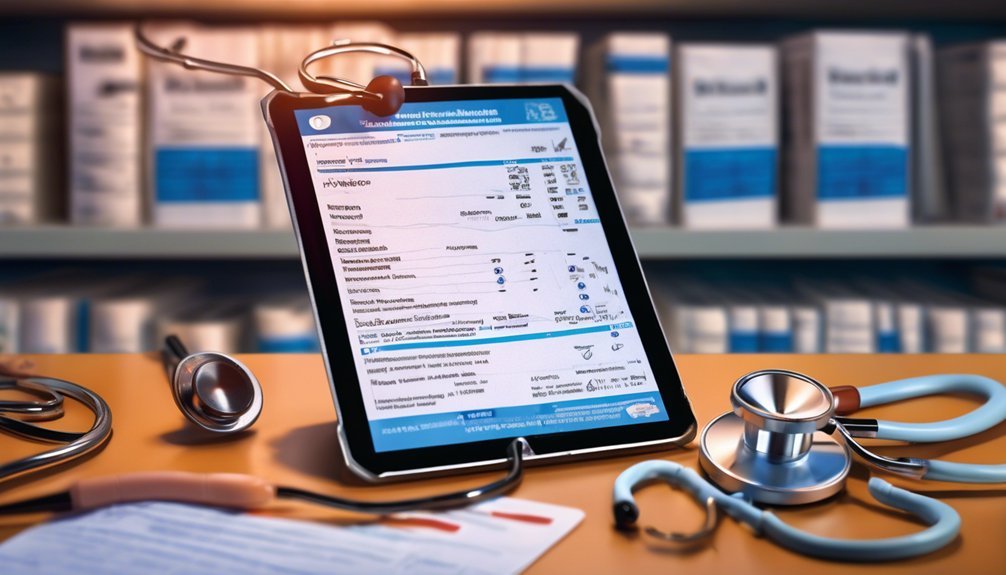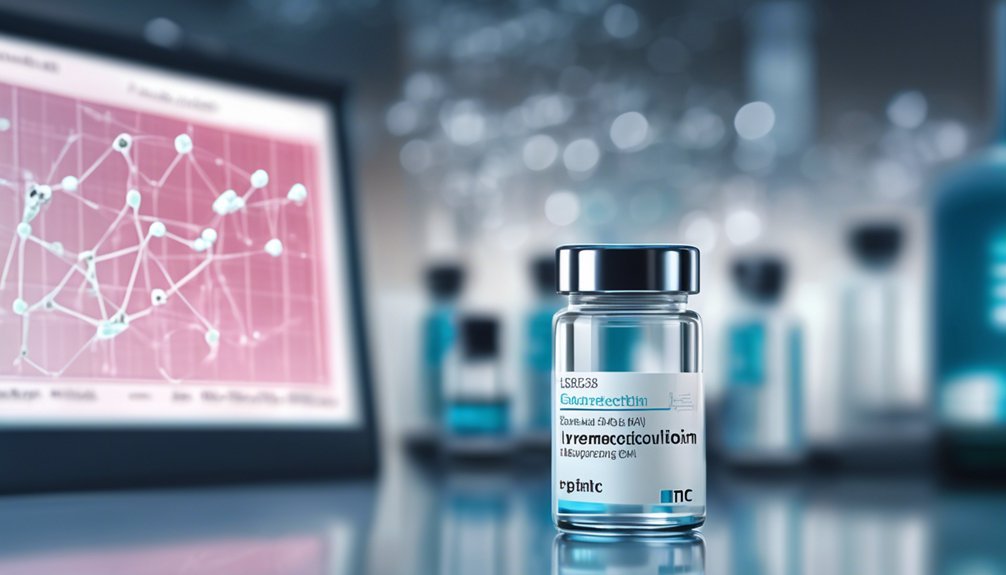Self-administering antiparasitic medications can lead to serious health risks, particularly concerning liver function and neurological stability. Without professional oversight, you might misuse dosages, increasing the likelihood of hepatotoxicity and cognitive impairments. Additionally, the potential for harmful drug interactions raises further concerns. Understanding these risks is essential for anyone considering self-treatment. What should you know about safe practices and the importance of medical guidance?
Key Takeaways
- Self-use of antiparasitic medications can lead to liver damage due to improper dosing and potential toxicity.
- Antiparasitic drugs may cause neurological risks, including cognitive impairment and increased seizure susceptibility.
- Without medical supervision, individuals may experience mood alterations and anxiety from certain antiparasitic treatments.
- Drug interactions with antiparasitic medications can enhance toxicity, especially when combined with antibiotics or anticonvulsants.
- Monitoring for adverse reactions is crucial, as symptoms may include gastrointestinal issues, neurological changes, and skin reactions.
Understanding Antiparasitic Medications

When considering the use of antiparasitic medications, it’s crucial to understand their specific mechanisms and intended applications. These medications vary widely in their antiparasitic effectiveness, targeting different parasites and infections. For example, some are effective against protozoa, while others focus on helminths. Recognizing which medication suits a particular infection is vital for successful treatment.
Moreover, dosage considerations play a key role in ensuring efficacy and minimizing potential side effects. Administering the correct dosage based on individual factors such as age, weight, and health status is essential.
This precision not only enhances treatment outcomes but also helps prevent resistance development. By fully understanding these aspects, you can better serve others in need of antiparasitic interventions, ensuring safe and effective care.
The Importance of Medical Supervision
Medical supervision is essential in the use of antiparasitic medications, as it ensures safe and effective treatment outcomes tailored to individual needs.
Engaging in a medical consultation allows healthcare professionals to evaluate your specific situation, considering factors like existing health conditions and potential drug interactions. They provide critical oversight, ensuring dosage accuracy, which is vital for maximizing efficacy while minimizing risks.
Self-use often leads to improper dosing or inappropriate medication choice, increasing the likelihood of adverse effects. By prioritizing medical supervision, you not only enhance your treatment success but also safeguard the health of those you serve.
Potential Liver Damage From Self-Use
Although antiparasitic medications can be effective, self-use poses significant risks, particularly concerning liver damage. When you bypass professional guidance, you may not adhere to proper dosage guidelines, leading to potential toxicity.
Antiparasitic drugs often require careful monitoring of liver function, as they can induce hepatotoxicity. Without medical oversight, you risk exacerbating underlying liver conditions or unknowingly taking contraindicated medications, increasing the chance of severe liver impairment.
Research indicates that even standard dosages can provoke adverse effects in individuals with compromised liver health. By seeking professional advice, you not only ensure appropriate treatment but also safeguard the integrity of liver function, ultimately enhancing your ability to serve others effectively and responsibly.
Prioritizing safety should always be your foremost consideration in any treatment plan.
Neurological Risks Associated With Antiparasitic Drugs

Self-use of antiparasitic drugs can also lead to serious neurological risks that often go unnoticed without professional guidance.
These risks can significantly affect your well-being, especially when misusing these medications. Here are three key concerns:
- Cognitive effects: Antiparasitic drugs may impair cognitive functions, leading to confusion and diminished memory capacity.
- Seizure risk: Certain medications can increase the likelihood of seizures, particularly in individuals with pre-existing neurological conditions.
- Mood alterations: Some users report mood swings or anxiety, which can complicate treatment and recovery.
Understanding these potential neurological risks is crucial.
Prioritizing professional advice ensures you navigate these challenges effectively, safeguarding both your mental and physical health.
Common Drug Interactions to Be Aware Of
When considering the use of antiparasitic drugs, it’s essential to recognize the potential for significant drug interactions that can complicate treatment.
Many antiparasitics undergo extensive drug metabolism, often involving liver enzymes like CYP450. This means they can interact with other medications that either inhibit or induce these enzymes, leading to altered therapeutic effects.
Antiparasitics can significantly interact with medications through liver enzymes like CYP450, impacting their effectiveness and safety.
For instance, combining antiparasitics with certain antibiotics or anticonvulsants may enhance toxicity or reduce efficacy through various interaction mechanisms.
Additionally, be cautious with medications affecting the same metabolic pathways, as this can increase the risk of adverse effects.
Being aware of these interactions is vital to ensure safe and effective treatment for those you aim to help. Always consult a healthcare professional for guidance.
Signs of Adverse Reactions to Monitor
Recognizing the signs of adverse reactions to antiparasitic drugs is crucial for ensuring patient safety and treatment effectiveness.
By implementing clear monitoring protocols, you can help identify and address potential issues early.
Pay attention to the following adverse symptoms:
- Gastrointestinal disturbances: Nausea, vomiting, or diarrhea may indicate a negative reaction.
- Neurological changes: Headaches, dizziness, or confusion should prompt immediate evaluation.
- Skin reactions: Rash or itching could signify an allergic response.
The Role of Prescription Guidelines

Monitoring adverse reactions to antiparasitic medications is important, but so is understanding the framework that guides their prescription. Prescription guidelines play a crucial role in ensuring patient safety and effectiveness. They promote prescription adherence, helping healthcare professionals make informed choices based on evidence and best practices.
Here’s a simple overview of the guideline importance:
| Aspect | Description |
|---|---|
| Patient Safety | Guidelines minimize risks of adverse reactions. |
| Treatment Efficacy | Evidence-based protocols enhance outcomes. |
| Standardization | Consistent practices across healthcare settings. |
Safer Alternatives and Preventive Measures
While the use of antiparasitic medications can be effective, exploring safer alternatives and preventive measures is essential to reduce potential risks.
Consider these strategies:
- Natural Remedies: Research shows that certain herbs, like wormwood and garlic, may help combat parasites. Always consult with a healthcare professional before trying these options.
- Dietary Prevention: Maintaining a balanced diet rich in fiber and antioxidants can strengthen your immune system, making it harder for parasites to thrive. Focus on fresh fruits, vegetables, and whole grains.
- Hygiene Practices: Regular handwashing and practicing safe food preparation techniques can significantly minimize your risk of parasitic infections.
Frequently Asked Questions
Can Antiparasitic Medications Treat Viral or Bacterial Infections?
Antiparasitic medications can’t treat viral or bacterial infections. Many hold misconceptions about their effectiveness, but understanding these treatment limitations helps ensure you provide accurate advice and support to those seeking appropriate medical interventions.
What Are the Signs of a Parasitic Infection?
Think of a detective searching for clues; you’ll spot symptoms checklist items like unexplained weight loss, fatigue, digestive issues, or skin rashes. These infection indicators could signal a parasitic infection needing attention and care.
How Do I Know if I Need an Antiparasitic?
To determine if you need an antiparasitic, assess your symptoms carefully. If they align with common parasitic infections, consider diagnostic testing to confirm. This ensures a targeted approach to treatment, ultimately benefiting your health and those you serve.
Are There Natural Alternatives to Antiparasitic Medications?
Think of your body as a garden; herbal remedies like garlic and wormwood, combined with dietary adjustments, can help cultivate a healthier environment. Research these options carefully and consider consulting a healthcare professional for guidance.
What Is the Cost of Prescription Antiparasitic Medications?
Prescription antiparasitic medication pricing varies widely based on factors like insurance coverage, pharmacy location, and specific drug. It’s crucial to consult your healthcare provider and insurance plan to understand potential costs and coverage options.
Conclusion
In summary, self-serving strategies with antiparasitic medications can spell serious safety concerns, including significant liver damage and neurological nuisances. Without proper professional oversight, the risks multiply, leading to potential pitfalls like adverse drug interactions. Prioritizing prudent practices, seeking medical supervision, and sticking to strict prescription guidelines are essential for safeguarding your health. Remember, responsible use can prevent perilous consequences, promoting effective treatment and protecting your well-being. Stay informed, stay safe, and always consult a healthcare provider before proceeding.





